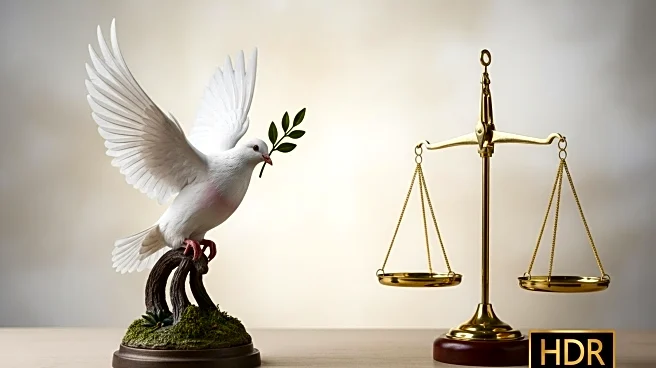What is the story about?
What's Happening?
European Union members are set to meet in Luxembourg to discuss their potential support for President Donald Trump's Gaza peace deal. The deal, brokered by the U.S., includes a prisoner-hostage swap and a ceasefire agreement between Israel and Hamas, aimed at ending the prolonged conflict in Gaza. The EU is considering joining the Board of Peace to maximize its influence on Gaza's future. Trump's involvement in the peace process has been pivotal, with the recent summit in Sharm el-Sheikh, Egypt, marking a significant step towards regional stability. The EU's decision to support the deal could enhance its role in Middle Eastern diplomacy and contribute to the reconstruction efforts in Gaza.
Why It's Important?
The EU's potential support for Trump's Gaza peace deal signifies a major shift in international diplomacy, highlighting the importance of collaborative efforts in resolving long-standing conflicts. By joining the Board of Peace, the EU could play a crucial role in ensuring the successful implementation of the ceasefire and supporting Gaza's reconstruction. This move could strengthen EU-U.S. relations and enhance Europe's influence in Middle Eastern politics. The peace deal also represents a significant achievement for Trump's administration, potentially boosting his diplomatic credentials and impacting U.S. foreign policy priorities.
What's Next?
The upcoming EU meeting in Luxembourg will determine the extent of Europe's involvement in supporting the Gaza peace deal. If the EU decides to join the Board of Peace, it could lead to increased diplomatic engagements and collaborative efforts with the U.S. and other stakeholders. The focus will likely be on ensuring the ceasefire's sustainability and facilitating Gaza's reconstruction. The EU's decision could also influence other international actors to support the peace process, potentially leading to broader regional stability.
Beyond the Headlines
The EU's involvement in the Gaza peace deal raises questions about the balance of power in international diplomacy and the role of multilateral organizations in conflict resolution. It also highlights the ethical considerations of supporting peace efforts in regions with complex political dynamics. The decision could reflect broader cultural shifts towards collaborative diplomacy and the importance of international partnerships in addressing global challenges.















